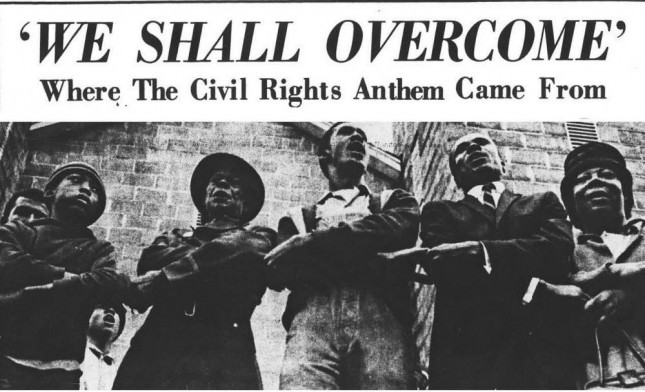Fresh from a $14 million victory that had Warner/Chappell backing off from ownership claims over “Happy Birthday to You,” the attorneys at Wolf Haldenstein now have chosen their encore with a new lawsuit that seeks to establish that the worldwide famous protest song, “We Shall Overcome,” is conclusively in the public domain.
The putative class action, filed Tuesday in New York federal court against the Richmond Organization and Ludlow Music, Inc., seeks a declaratory judgment, injunctive relief and the return of money for the licensing of this song.
Set up as the unofficial anthem to the Civil Rights Movement and the “most powerful song of the 20th Century,” according to the Library of Congress, “We Shall Overcome” is said in the lawsuit to be an adaptation of an earlier African-American spiritual with its first known printed reference in the February 1909 edition of the United Mine Workers Journal. The song, mentioned in Martin Luther King Jr.’s final sermon, has remained popular in the Black Lives Matter movement.
The lineage, if challenged, will focus on those who succeeded American folk singer Pete Seeger.
According to the complaint (read below in full), Seeger founded an organization in 1945 called People Songs, Inc. (PSI), and began publishing a periodical that in 1946 included the entire “We Shall Overcome” musical composition with authorship credited to the FTA-CIO Workers Highlander Students. The September 1948 edition of People’s Songs was registered with the Copyright Office before Seeger’s company went out of business.
Ludlow is said to have filed his own registration in 1960 for an “unpublished derivative work” crediting Zilphia Horton, the wife of a member on PSI’s advisory committee, as the author of new words and a musical arrangement. Credit also was given to Frank Hamilton and American folk singer Guy Carawan, and documents stated that the original registration came for the title, “I’ll Overcome.”
“Despite Defendant Ludlow’s claim in the Registration Application for Reg. No. EU645288, upon information and belief, no musical composition entitled ‘I’ll Overcome’ was registered with the copyright office at any time prior to 1960,” states the lawsuit. “Based upon information and belief, Defendant Ludlow completed the Registration Application in 1960 listing ‘I’ll Overcome’ as the original work to create ambiguity as to what song the Registration Application referred. Moreover, based upon information and belief, Defendant Ludlow did not have permission from the authors of any such original work to publish a derivative work therefrom.”
With permission from Ludlow, Seeger would later record his copyrighted version of the song in 1963, and other works followed.
Relying upon a 2013 musicologist report, the plaintiffs assert that the song is essentially the same as the one that came in the 1940s periodical and, as such, the song entered the public domain no later than 1976. The lawsuit also includes excerpts from the writings of Seeger himself. The iconic folkster wrote such things as, “No one is certain who changed ‘will’ to ‘shall,'” “In the early ’60s, Pete, Guy Carawan and Frank Hamilton copyrighted the song to protect it from being turned into an insipid pop song” and “In the early ’60s, our publishers said to us, ‘If you don’t copyright this now, some Hollywood types will have a version out next year like, ‘Come on Baby, We shall overcome tonight.’”
The lead plaintiffs in the lawsuit, going as the We Shall Overcome Foundation, say they are producing a documentary movie and that “We Shall Overcome” will be performed in it. (In this way, the lawsuit is almost a match to the one over “Happy Birthday,” which also was brought by a documentary filmmaker.) In February 2015, they requested a quote for a sync license from the defendants and got back the following message:
“WE SHALL OVERCOME is a difficult song to clear. I have been advised by our historians that we will need to review the recording that is intended to be used. The song cannot be cleared without reviewing what’s being sung and the quality of the representation of the song. Please provide this information so that we can further process.”
Nefertiri Lewis was hired to sing it a cappella, an audio file was sent to the publisher and, a month later, the defendants refused to let the filmmakers use it without much explanation as to why not.
According to the complaint, “Because Defendants claim to own an exclusive copyright for We Shall Overcome and has refused to grant permission for Plaintiff WSOF to use the Song, in particular the lyrical first verse recorded by Ms. Lewis, Plaintiff faces a statutory penalty of up to $150,000 under the Copyright Act if it uses the song in the documentary it is producing if Defendants, in fact, own the copyright that it claims. As a result, Plaintiff has been unable to complete the documentary movie it is producing because Defendants refuse to grant it a synchronization license to use the Song.”
The lawyers in the battle — Randall Newman, Mark Rifkin and Gloria Melwani — now are pushing the judge to rule that the defendants do not have the right to prohibit the use, reproduction, distribution or public performance of the melody or lyrics. They also assert a violation of a New York statute against deceptive acts and practices with treble damages up to $1,000 per violation, punitive damages, reasonable attorneys’ fees and costs. Other claims include breach of contract, money had and received as well as rescission for failure of consideration. One recent attempt to free a work (“Buck Rogers”) from copyright grip failed when the plaintiff had trouble showing a justiciable controversy, but if the plaintiffs are able to hurdle past any initial procedural barriers, this lawsuit plus the prior “Happy Birthday” case show there could be a budding mini-specialty practice devoted to public domain pushes.
“We Shall Overcome” also was featured in this 2015 article in The Atlantic, which reported there are elements of the song that trace back to the 18th century, a Beethoven hymn, and gives the modern version as deriving from something sung during a 1940s strike at the American Tobacco Company. Carawan, a war veteran who joined the folk movement, is credited with popularizing it by leading nonviolent protesters in renditions of the song during the early 1960s. He died last year.
Further reading on the history and origins of this song, please visit We Shall Overcome: Origins as gospel, folk, and labor song.
Source: www.hollywoodreporter.com





Be the first to comment on "“Happy Birthday” Legal Team Seeks to Free “We Shall Overcome” From Copyright"